Products
Products
Milling system
Thermo Fisher's automated milling system integrates the Mini Mill milling machine from Haas Inc. with the Thermo Scientific ARL PrepControl automation system. The milling system is designed for preparing ferrous metals for spectroscopic analysis. According to the company, it features a direct drive spindle that runs at speeds of up to 6000 rpm and provides optimal torque at low-end speeds for milling iron and steel. Thermo Fisher Scientific Inc., Madison, WI.
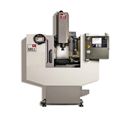
Mass spectrometer
The AXIMA MegaTOF MALDI Mass Spectrometer from Shimadzu is designed to detect macromolecules as large as 1500 kDa. Developed with a CovalX high-mass system, it can carry out applications such as protein-complex characterization, therapeutic protein aggregate analysis, polymer analysis, and high-mass bioimaging. Shimadzu Scientific Instruments, Inc., Columbia, MD.

Microwave digestion system
Milestone's UltraWAVE benchtop microwave digestion system is designed to provide shorter turnaround times for digestion of samples for trace metals analysis, including high matrix samples for analysis by collision-cell ICP-MS. The system uses disposable glass vials instead of traditional digestion vessels. The system features the company's single reaction chamber (SRC) technology. Milestone Inc., Shelton, CT.
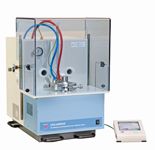
Spectrometer
The AvaSpec Sensline ULS2048x16-USB2 and ULS2048x64-USB2 spectrometers from Avantes are designed for applications requiring high sensitivity such as fluorescence spectroscopy and low-light-level detection. According to the company, the spectrometers, feature an ultralow-stray-light optical bench and back-thinned CCD detectors with high quantum efficiency for measurements in the UV to NIR range of 200–1160 nm. Avantes, Inc., Broomfield, CO.
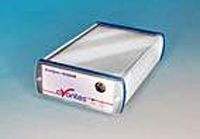
Confocal Raman imaging system
WITec's True Surface Microscopy imaging mode is designed to allow large-area topographic coordinates from the profilometer measurement to be precisely correlated with the large-area confocal Raman imaging data. This option reportedly enables samples that would normally require extensive preparation to obtain a certain surface flatness to be automatically characterized as they are. According to the company, it allows scan ranges as large as 50 mm × 100 mm with a spatial resolution of 100 nm vertically and 10 μm laterally. WITec GmbH, Ulm, Germany.
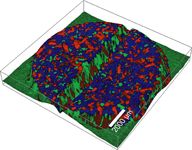
UV-Vis calibration standards
Nano-deposition calibration standards from NSG Precision Cells are designed for use with UV-Vis spectrophotometers. According to the company, the solid-based standards never have to be replaced or recalibrated. NSG Precision Cells, Farmingdale, NY.
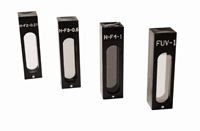
Miniature spectrometer
The Glacier X thermoelectric-cooled miniature fiber-coupled spectrometer from B&W Tek is designed for applications that require portability. The system reportedly is available with wavelength configurations ranging from as low as 200 nm to as high as 1050 nm with resolutions between 0.6 nm and 4.0 nm. According to the company, the spectrometer comes equipped with a 2048-element linear CCD array, a built-in 16-bit digitizer, and a USB 2.0 interface. B&W Tek, Inc., Newark, DE.
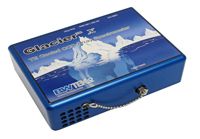
ICP-MS system
The NexION 300 ICP-MS system from PerkinElmer is designed for parts-per-trillion detection of trace elements. According to the company, the system reduces the need for daily user maintenance and cleaning. The instrument reportedly provides three modes of interference removal: standard, collision, and reaction. The modes are designed for routine analyses, semiquantitative analyses, and analyses of difficult elements and matrices, respectively. PerkinElmer, Inc., Waltham, MA.
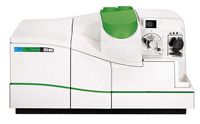
Axicons
Edmund Optics Plano-Convex axicons are used to produce a nondiffractive ring-shaped beam that increases in diameter over distance while retaining a constant ring thickness. According to the company, they feature one conical and one plano surface and a precision fused-silica substrate. Available uncoated or with a wide selection of antireflective coatings, the axicons can be used for medical, research, measurement, and alignment applications. Edmund Optics, Barrington, NJ;
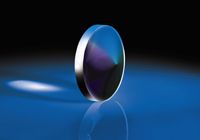
Silicon drift detector
The Super SDD silicon drift detector from Amptek is designed for high-count rate applications in hand-held systems and bench-top analyzers. The X-ray detector, preamplifier, and cooler system reportedly are thermoelectrically cooled. The input FET and a feedback circuit are mounted on the detector's two-stage cooler and are kept at approximately -55 °C. According to the company, the 25 mm2 × 500 μm detector provides an FWHM resolution of 127 eV, a peaking time of 11.2 μs, and a peak-to-background ratio of 8000. Amptek, Inc., Bedford, MA;
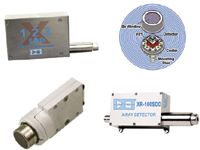
Website
SPEX CertiPrep's website is designed to enable users to purchase organic and inorganic certified reference materials. The site includes a search function, a custom standard request form, and live chat for access to the company's support staff. Products include certified reference materials for AA, ICP, ICP-MS, and IC analytical instrumentation. SPEX CertiPrep, Metuchen, NJ;

Raman microscope
The XploRA INV compact analytical Raman chemical imaging microscope from HORIBA Scientific reportedly combines the automatization features and small footprint of a standard confocal Raman microscope with the capabilities of an inverted microscope for biological applications such as cell research, cancer detection, pharmaceutical verification of intercellular activities, inclusion of microreactors, and incorporation of AFM units for tip-enhanced Raman spectroscopy. According to the company, the microscope's open structure permits the use of options and add-ons for inverted microscopes, such as micromanipulators, "optical tweezers," and specific enclosures for cell applications. HORIBA Scientific, Edison, NJ;
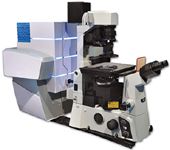
Spectrophotometer accessories
Thermo Fisher's Calibration Validation Carousel (CVC) accessories for the company's Evolution UV-Vis spectrophotometers are designed to reduce the amount of hands-on time required to complete instrument qualification and testing. According to the company, each accessory is supplied with its own serial number matched to a data file containing the calibrated value of the standards and the instrument specifications, which reduces the potential for transcription and calculation errors. The accessories are available in USP- or EP-configurations for pharmacopeia compliance. Thermo Fisher Scientific, Inc., Madison, WI;
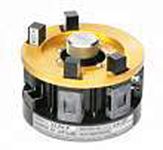
Inorganic materials database
ICDD's PDF-4+ 2010 database provides comprehensive material coverage for inorganic materials. According to the company, the database can be used for phase identification using physical, chemical, and crystallographic data. It reportedly contains 301,282 data sets, digitized patterns, molecular graphics, and atomic parameters. The database enables quantitative analysis to be performed by any of three methods: Rietveld analysis, reference intensity ratio (RIR) method, or total pattern analysis. International Centre for Diffraction Data, Newtown Square, PA;
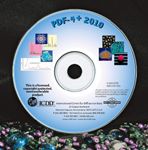
Raman microscope
BaySpec's MovingLab Raman microscope is designed to provide repeatable, reliable performance in a portable, ruggedized package. The microscope can be used for liquid or solid analysis at the point of sampling out in the field. According to the company, the microscope features optional 532-, 785-, and 1064-nm excitation wavelengths and comes with an on-board swivel-notebook computer with a USB 2.0 output to external PC/monitor. BaySpec, Inc., San Jose, CA;
Cameras
The Synapse-I cameras from HORIBA Scientific are designed for low light level sensitivity and quantitative measurements in a single measurement. The cameras reportedly combine low-noise electronics, large pixels, high QE, and deep cooling to -70 °C. Applications include chemiluminescence, in-vivo imaging, and semiconductor failure analysis. The cameras are available with both front- and back-illuminated CCDs in 512 × 512 and 1024 × 1024 formats and come with either V++ imaging software or VspecPro software for dual imaging and spectroscopy use. Interchangeable mounts allow coupling to either a lens or a range of the company's spectrometers. HORIBA Scientific, Edison, NJ;
Temperature control accessories
The Falcon accessories from PIKE Technologies are designed to provide precise temperature control for quantitative analysis of liquid samples. An NIR version accommodates glass vials ranging from 5 to 12 mm in diameter or 10–20 mm cuvettes. According to the company, various demountable liquid cells and spacers can be used with the FT-IR version of this accessory. Both designs reportedly feature Peltier cooling and electric (resistive) heating. Temperature ranges are 5–105 °C with an accuracy of ± 0.5% for both versions. The accessories are compatible with most brands of spectrometers. PIKE Technologies Inc., Madison, WI;
Gas generators
Parker Balston FT-IR Purge Gas generators from Parker Hannifin are designed for use with FT-IR spectrometers to provide a purified purge gas and air bearing gas using standard compressed air. According to the company, they remove impurities such as water vapor and carbon dioxide to a -100 °F pressure dew point and less than 1 ppm, respectively. The wall-mountable generators reportedly are available with flow capacities of 3.1–102 L/min. Parker Balston, Haverhill, MA;
Gratings
Gold gratings from Optometrics are ruled directly in gold for IR (4–12 μm) laser applications. Gold gratings reportedly are important to IR lasers because their increased efficiency allows more of the generated light to be used. According to the company, the gratings' resistance to degradation allows them to be used in high-power applications that might damage gratings having a thin gold coating over aluminum. The gratings are available on copper, invar, ceramic, and silicon substrates. Optometrics, Inc., Ayer, MA;
NIR spectrometers
The DWARF-Star RED-Wave NIR spectrometers from StellarNet are equipped with an InGaAs detector array for the 900–1700 nm wavelength range. The spectrometers reportedly achieve 1.5-nm resolutions. According to the company, the spectrometers feature no moving parts and a small size for hardware integration. Each system comes with the company's SpectraWiz software and source codes, customizable demo programs, and full spectroscopy applications in LabVIEW, Visual Basic, Delphi Pascal, and MS Visual C. StellarNet, Inc., Tampa, FL;
Calibration standards
Hellma's liquid and glass calibration filters are designed for testing spectrophotometers. The company has announced accreditation for the calibration standards according to DIN EN ISO 17025. According to the company, the accreditation ensures the traceability of calibrations carried out to references of NIST, by which an international correlation of measurement results is enabled and laboratory procedures gain greater transparency and improved protection of measurement results. Hellma USA, Inc., Plainview, NY;
EDXRF detectors
Moxtek's XPIN detectors are designed for use in benchtop and handheld energy dispersive X-ray fluorescence (EDXRF) instrumentation. The detectors reportedly are optimized to provide maximized resolution, count rate, energy absorption, and peak-to-peak background for various industrial and scientific applications. Moxtek, Inc., Orem, UT;
Photovoltaic measurement system
Newport Corporation's Oriel IQE-200 photovoltaic cell measurement system is designed for simultaneous measurement of the external and internal quantum efficiency of solar cells, detectors, and other photon-to-charge converting devices. The system reportedly splits the beam to allow for concurrent measurements. The system includes a light source, a monochromator, and related electronics and software. According to the company, the system can be used for the measurement of silicon-based cells, amorphous and mono/poly crystalline, thin-film cells, copper indium gallium diselenide, and cadmium telluride. Newport Corporation, Irvine, CA;
Optical filters
Optical filters designed with sputtered coatings are available from CVI Melles Griot. The narrowband, broadband, and edge filters for fluorescence, microscopy, flow cytometry, and image processing reportedly provide 5-6 OD blocking and maintain a transmission of greater than 98%. According to the company, standard and custom designs are available. CVI Melles Griot, Carlsbad, CA;
ICP application note
An application note from Teledyne Leeman Labs describes oil additives analysis with the company's ICP system. The note, titled "The Analysis of Oil Additives Using the Prodigy High Dispersion ICP," demonstrates the instrument's ability to determine a range of elements in two oil additive sets. According to the note, the instrument can be used to provide accurate and reliable results for a suite of elements in oil additive samples using a radial plasma. Teledyne Leeman Labs, Hudson, NH;
Raman systems
The ProRaman-L systems from Enwave Optronics are designed for high-sensitivity industrial and laboratory Raman applications. The systems feature a 785-nm frequency-stabilized laser, a spectrograph with cooled CCD options from -50 °C to -70 °C, and a high-throughput laboratory fiber-optic probe. The systems reportedly achieve approximately 4.5 cm average optical resolution with various ranges of spectral coverage: ~250-2350 cm-1, ~100-2200 cm-1, and ~100-3300cm-1. The systems' laser power is ~300-400 mW, with higher output power available upon request. Enwave Optronics, Inc., Irvine, CA;
Raman microscope
Renishaw's inVia Raman microscope can be used for nondestructive testing of sperm DNA for assessing the healthiness of sperm cells. The instrument can be customized to integrate optical tweezing, which enables researchers to immobilize sperm cells with a tightly focused laser beam. The resulting Raman spectra contain information about the vibrations of molecules within the sperm cells and can be used to assess the state of its DNA. Renishaw, Hoffman Estates, IL;
Inorganic standards catalog
Inorganic Ventures' 2010-2011 catalog of inorganic reference materials includes standards for ICP, ICP-MS, IC, AA, and wet chemistry applications. Standards are color-coded by application and indexed by catalog number and subject. Inorganic Ventures, Christiansburg, VA;
Ion-trap MS system
The amaZon SL ion-trap mass spectrometer from Bruker Daltonics is designed to enhance the productivity and analytical capabilities of laboratories performing structural molecular analyses. The system reportedly features automated software, fast data acquisition at full isotopic resolution in MS and MS-MS modes for use with UHLPC, on -the-fly polarity switching, reproducible fragmentation efficiency, and low maintenance requirements. Bruker Daltonics, Billerica, MA;
UV-Raman spectrometer
The McPherson Commander f/4.8 triple spectrometer is designed for UV and wide-wavelength-range Raman applications. The spectrometer has continuously tunable wavelength positioning for use with tunable lasers, to seek resonance, or at deep UV wavelengths where filters are not available. Purge fittings are provided for experiments that approach the oxygen absorption envelope. According to the company, the configuration of slit width, apertures, and gratings are user-controlled. A single-stage bypass reportedly allows dedicated use of the spectrograph. McPherson, Inc., Chelmsford, MA;
Synchronized fiber-based laser system
The Synchronized Programmable Picosecond laser platform from Genia Photonics is designed for nonlinear spectroscopy applications such as coherent anti-Stokes Raman scattering, optical coherence tomography, and with a dithering option, stimulated Raman scattering spectroscopy. The laser system comprises the company's programmable laser and Picosecond Master Oscillator power amplifier (MOPA). According to the company, the system delivers a single combined and synchronized dual-wavelength output, and each laser can operate independently. The programmable laser reportedly is a dispersion-tuned, actively mode-locked fiber laser designed to provide picosecond pulses at variable rates and wavelengths. Genia Photonics Inc., Lasalle, Quebec, Canada;
FT-IR spectrometer
Thermo Fisher Scientific's Nicolet iS5 FT-IR spectrometer is designed for product assurance testing, basic troubleshooting, and chemistry teaching. The small-footprint spectrometer reportedly provides performance comparable to full-size spectrometers. The instrument reportedly is powered by the company's OMNIC software and includes an open-architecture sample compartment that accepts various sampling accessories. According to the company, the spectrometer can be used for raw materials, impurities, and mixtures identification. Thermo Fisher Scientific Inc., Madison, WI;
www.thermoscientific.com/ftir/
UV-Vis spectrophotometers
The Evolution 200 UV-Vis spectrophotometers from Thermo Fisher Scientific feature the company's INSIGHT software with customized scripting capabilities. Three models are available for applications ranging from standard quantitative analysis to research life science assays. According to the company, the instruments are designed for routine QA/QC analyses in the life science, food and beverage, and material science industries and for fast data collection rates for kinetics measurements (up to 100 data points/s). The instruments are available in both local and computer-controlled configurations. Thermo Fisher Scientific Inc., Madison, WI;
www.thermoscientific.com/evo200
NIR spectrometer
The Sol2.2A NIR spectrometer from B&W Tek provides a spectral range out to 2.2 μm. The spectrometer reportedly features a built-in autozero function. The instrument is designed with four levels of gain for use in low light level NIR detection. According to the company, the spectrometer is equipped with a built-in three-stage cooler that allows for integration by providing +5 V DC power. B&W Tek, Inc., Newark, DE;
Cryogenic grinder
SPEX SamplePrep's model 6970 Enclosed Freezer/Mill includes a totally enclosed liquid nitrogen autofill system with external loading of sample vials. The instrument's dual grinding chambers, which are positioned in the liquid nitrogen reservoir, are accessed through external gates. The grinder is designed with magnetically powered impactors and is controlled by a color touch screen interface that can store as many as 10 programs. Users reportedly can control both grinding chambers for independent operation with different protocols. SPEX SamplePrep LLC, Metuchen, NJ;
UV-Vis spectrophotometer
The model 8453 UV-Vis spectrophotometer from Agilent Technologies uses a photodiode-array detector to make measurements throughout the 190–1100 nm wavelength range. According to the company, measurements are made in less than 1 s. The system reportedly is coupled with the company's UV-Visible ChemStation software for data analysis, data archival, and compliance with pharmacopoeia requirements and good laboratory practices. Agilent Technologies, Inc., Santa Clara, CA;
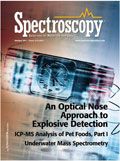
LIBS Illuminates the Hidden Health Risks of Indoor Welding and Soldering
April 23rd 2025A new dual-spectroscopy approach reveals real-time pollution threats in indoor workspaces. Chinese researchers have pioneered the use of laser-induced breakdown spectroscopy (LIBS) and aerosol mass spectrometry to uncover and monitor harmful heavy metal and dust emissions from soldering and welding in real-time. These complementary tools offer a fast, accurate means to evaluate air quality threats in industrial and indoor environments—where people spend most of their time.
NIR Spectroscopy Explored as Sustainable Approach to Detecting Bovine Mastitis
April 23rd 2025A new study published in Applied Food Research demonstrates that near-infrared spectroscopy (NIRS) can effectively detect subclinical bovine mastitis in milk, offering a fast, non-invasive method to guide targeted antibiotic treatment and support sustainable dairy practices.